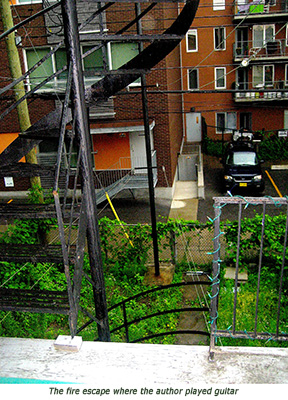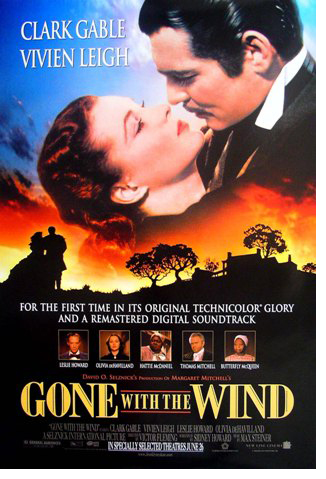 On the afternoon in question I’ve been living in the City of Saints for four months. I’m outside on a small balcony that faces a back alley and softly strumming my guitar. Without thinking I start playing and humming the illustrious Mancini theme from Breakfast at Tiffany’s.
On the afternoon in question I’ve been living in the City of Saints for four months. I’m outside on a small balcony that faces a back alley and softly strumming my guitar. Without thinking I start playing and humming the illustrious Mancini theme from Breakfast at Tiffany’s.
I look back into my apartment. I have no furniture. I’m sitting on a fire escape playing a guitar and singing “Moon River” with a heart full of tender longing.
I’ve become Holly Golightly, the poor, rural southern gal who’s come to New York in Breakfast at Tiffany’s to become a fine lady.
Except that instead of being a glamourous escort girl hitting up rich men for milk money I’m a jeans-and-baggy-sweater wearing digital nomad, working online to earn my groceries. Instead of a writer living upstairs there’s a jolly elderly Greek named George, who can’t remember my name but who crushes me painfully to his bosom every time he sees me on the street. And instead of being a delicate little waif daintily munching croissants I’m a big husky Maritimer with a taste for dulse, rappie pie, and Solomon Gundy.
Of course, Holly Golightly (spoiler alert) isn’t her real name. Her real name is Lula Mae Barnes, and, as her new name suggests, she’s done well: Her diction is flawless, and she successfully apes the speech, dress, and comportment of a 5th Avenue debutante. All she needs now is a rich husband to make it all legit. Technically.
In spite of all the artifice, Holly is an amazing human being. As her agent says: “She’s a phony, but she’s a real phony.” It’s a line that resonates with meaning on several levels, saying as much about the nature of art? of film in particular? as it does about the character of this poor rube who’s miraculously managed to remake her persona in the image of her ideal woman.
Dare I stretch the comparison? Okay, I do hail from Boondocks, Nova Scotia, where I grew up milking cows, hauling water, and throwing in wood, all while wearing my dad’s buffalo plaid jacket. (During my preteen years I would often bitterly ask myself, “Would Barbie ever dress like this? Is this some work Barbie would do? Ever?”)
Of course I got away as soon as I could. Halifax wasn’t Glamour Central but it was a leap. Eventually home called me back and I settled there.
Neighbors remarked, “Jumpin,’ always thought ya’d move away. Too smart fer here.”
Later I left again? for another small rural town.
One day a friend asked, “Why are you always living in terra incognita? Look at yourself! You’re an intellectual, a poet! You love jazz and art films! You wear too much black eyeliner! Go to a big city!”
The writing was on the wall. I was Jed Clampett, and kinfolk were saying, “Move away from there.” (By the way, Buddy Ebsen, the actor who played Jed Clampett on The Beverly Hillbillies, also played Doc, Holly’s estranged husband, in Breakfast at Tiffany’s. See how the universe all gloms together sometimes?)
Montreal had always been my poetic dreamscape, my fantasy planet. I imagined walking down a wintry Sherbrooke street in a pea coat with the collar turned up, feeling cold and hungry and glad to be alive, “Bird on the Wire” playing on the soundtrack, on my way to a coffeehouse rendezvous with kindred spirits, fellow creative monsters with their fingers on the pulse o’ what’s happenin’ now.
I make it happen. Six months later I’m in Mark Twain’s “City of a Hundred Steeples,” trying to make a mark for myself as a poet in the town that had spawned my hero, Leonard Cohen, and wishing I had his money so I could afford to join the intelligentsia at a bohemian café.
One day I scrape together a little espresso money and head out to visit a local hangout, a place where all the pipes are showing, the cement floor bears scratched paint of varying hues, and the clients wear outfits no mother could love.
I run into my building’s handyman, Yves, and invite him to join me.
“I do not go to dat cafe,” he says disapprovingly. “Dey are red communist! Dey want separate!”
It’s just before the provincial election and his habitual ire against reds, separatists, and red separatists has peaked. He starts pointing out signs, remarking that those that were once bilingual are now in French only. Yves’s father is Hungarian, his mother Quebecoise and a separatist. The marriage hadn’t lasted long.
“I am sick of dis!” he spits. “Damn separatist ruin de Quebec. I want go to Toronto!”
Soon I finally get to perform my poems in public. The event is at a chic jazz club during Nuit Blanche, Montreal’s famous annual all-night citywide arts event.
The francophone poets get the first shot. We anglophones arrive early and sit there for hours trying to decipher what they’re saying. They’re done at 2:00 a.m., and it’s our turn to go on, at which point all the francophone poets and audience members get up and leave en masse.
There are only about ten people left, and they’re all performers. It’s just as well; I’ve picked poetic poems, not angry, ranting poems like everyone else, and my reading goes over like a lead balloon.
Back home it’s poor me, sprawled on the new chaise longue, the back of my hand resting on my forehead, bewailing the fact that here, even here I can’t win the adulation I so richly merit. I must be just too precious, too brilliant, too gifted for anywhere.
It’s all their fault?everyone has devolved into philistines, no one’s cultured anymore, everyone’s wandering around gabbing on hidden cellphones, like Bedlam escapees jibbering away to themselves, oblivious to the beauty around them, beauty that includes my radiant presence on the same street.
Then I remember the husky gal in buffalo plaid. I squeeze my eyes shut and wince.
And then I remember Holly. What I need is a pet cat called “Poor Slob,” a beast onto which I can project my humble origins and my loser persona. That will make everything better. I can then get on with trying to fake my way through life.
Perhaps one day I’ll even get to be a “real phony.”
Wanda also writes the blog The Mindful Bard:The Care and Feeding of the Creative Self.


